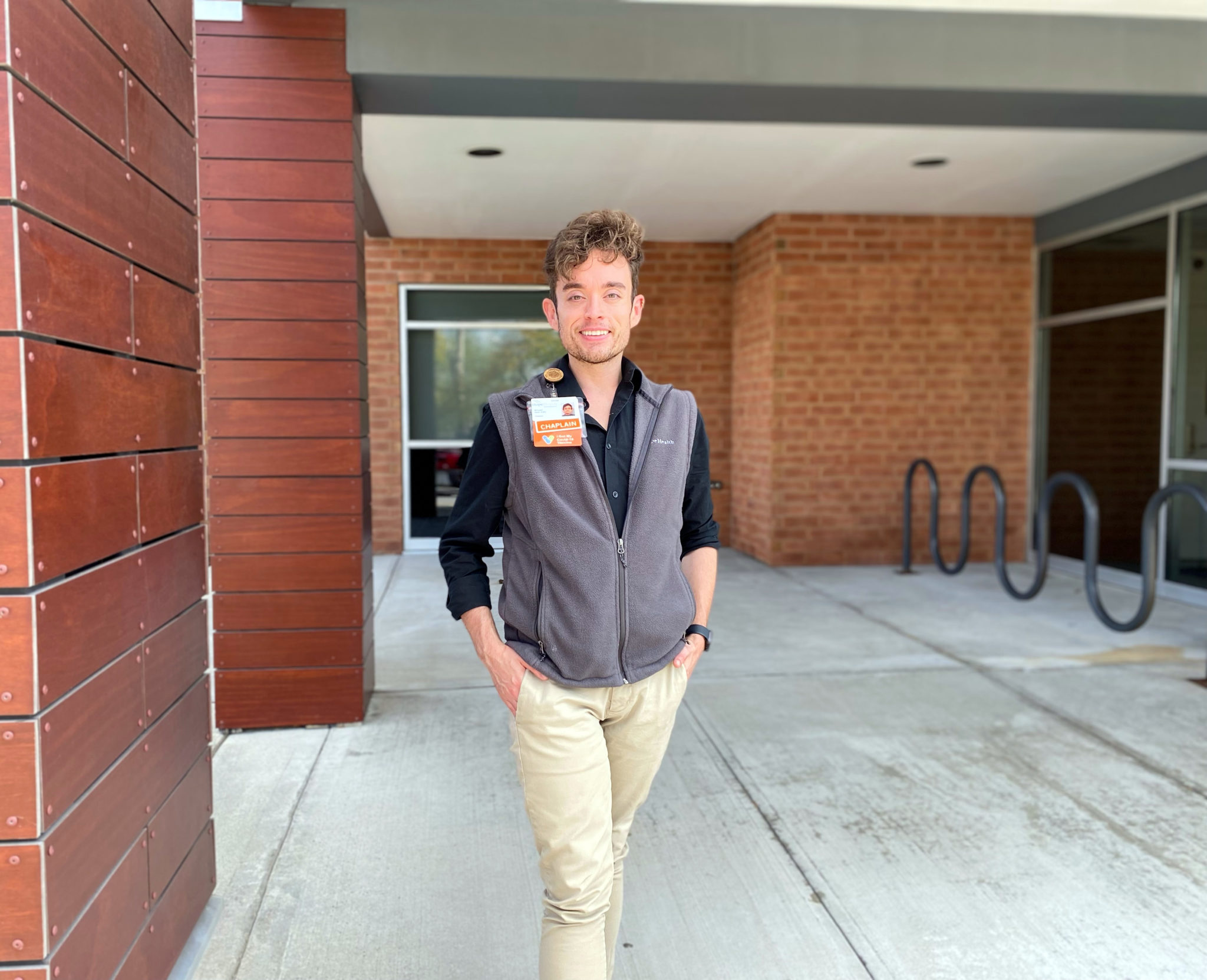In a traditional clergy role in a house of worship, people come to you. In health care it’s the other way around. Hospice chaplain Wilson Hood, M.Div., meets people where they are. That means places with unfathomably different experiences from his own as he provides spiritual care for those in long-term care facilities throughout Rhode Island. A 2019 graduate of Harvard Divinity School, Wilson began his hospice career in the emergency department at Massachusetts General Hospital before joining the HopeHealth chaplaincy team in 2020.
People often hear the word chaplain and right away think of religion. What do you tell them?
I have patients who are evangelical Christian, devout atheist, Muslim, Catholic, Jewish, Buddhist, agnostic, anything in between. Not everyone has a religion, but everyone has a spirituality. Everyone has something that anchors them, gives them meaning and helps them understand themselves and the world in a broader context. It’s my job to honor that to the best degree I can, to explore it and give people permission to talk about it. Because a lot of times, they feel like they can’t talk about it.
Why do people feel like they can’t talk about spiritual matters?
Many people feel the language of spirituality has become increasingly inaccessible to them, especially over the last few decades with more people unaffiliated from traditional religious institutions. You might say, “I don’t really think about the meaning of life because I don’t go to church.” It’s easy to set all this aside and not do the scary, emotional, challenging work of reflecting on who you are and what you believe. The truth is we all think about these issues. You just might not have the language for it. Often the first time people are forced to confront questions of spirituality is in the hospital or hospice setting, a time of crisis.
How do you see your role?
If there’s any unresolved tension or pain, if things have gone unsaid, either hard stuff or good stuff, my role is to be a neutral third party. People can share something if they want to, or they don’t have to share anything. The chaplain isn’t someone who just shows up the moment someone’s about to die and then disappears in a puff of smoke. I am there to honor and center the spirit of a person.
“Not everyone has a religion, but everyone has a spirituality. Everyone has something that anchors them, gives them meaning and helps them understand themselves and the world in a broader context.”
What are some ways that help you connect with patients who are at end-of-life and their families?
Often in a medical context, patients are asked, “What’s wrong? Where does it hurt?” They’re not often asked, “What’s keeping you going? What gives you strength?” It’s how I help someone feel like a person and not a patient. It’s important that we not let someone’s diagnosis or final stage eclipse who they are. I try to summon the wholeness of that patient into our space. Often that involves telling stories about the good times and the hard times. If I’m talking to families, I’ll say, “Tell me about your loved one. What is important to them? What makes them smile? What are some of your favorite memories with them? What’s their favorite song?”
What kind of responses do you get to these open-ended questions?
I had a patient who loved Broadway musicals and show tunes. He self-identified as spiritual, and for him what was sacred was Broadway music. We sat and listened to songs from his favorite shows and talked about what they meant to him, how the lessons from these shows shaped choices he made in his life. He said he really didn’t have anything to talk about with me as a chaplain. I told him, “You realize everything we just talked about with your life, and music was the chaplain visit. All of this has shaped who you are and will shape your legacy when you leave.”
What does spirituality mean to you?
To me, spirituality is whatever keeps you in connection with yourself, others and the sacred. For some, the sacred looks like God or gods or nature or a general sense of love and connection with other people and with the universe. For others, the sacred is being in touch with their deepest values — what means the most to them, whether that’s compassion or honesty or responsibility.
What made you interested in pursuing a career as a chaplain?
My mom is an ordained Baptist minister. I grew up a preacher’s kid in North Carolina. That gave me a great window into what faith is, what spirituality is, and what a spiritual community looks like, especially for people in really challenging moments.
What is it like working at HopeHealth?
I just I love this organization. I love my team. In hospice, the chaplain is a core member of the care team along with the social worker and the nurse case manager and the physician. We meet weekly, and everyone on the team understands my role. It sounds cliche to say, but we really are a family.
“To me spirituality is whatever keeps you in connection with yourself, others and the sacred.”

